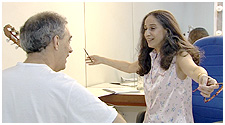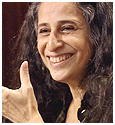|
|
| Georges Gachot |
|
| Der Filmemacher Georges Gachot wurde in Neuilly sur Seine in Frankreich geboren und besitzt die französische und schweizerische Staatsangehörigkeit. Seit 1990 dreht er Dokumentarfilme im Bereich der klassischen Musik. |
|
| Mit 18 Jahren verlässt George Gachot Paris und zieht in die Schweiz, wo er parallel zu seinem Studium als Elektroingenieur an der ETH Zürich (Diplom in 1988) seiner Leidenschaft für das Klavier und die Musikwissenschaft frönt. Nach ersten Schritten als Schauspieler in Werbe- und Spielfilmen (1985) arbeitet er bei einer auf klassische Musik spezialisierten Plattenfirma: er lanciert Videoclips, mit denen Musikwerke des allgemein bekannten klassischen Repertoires „visualisiert“ werden sollen. Später folgen Filmaufträge für diverse Fernsehstationen, es geht um Porträts von Komponisten und Interpreten. |
|
| 1996 beginnt er seine eigenen Filme zu produzieren, von denen einige auch im Kino gezeigt werden. Sein Porträt der argentinischen Pianistin Martha Argerich wird 2002 mit dem „Prix Italia“ ausgezeichnet. Seit 1996 interessiert sich Georges Gachot für Kambodscha und dreht drei abendfüllende Dokumentarfilme über dieses Land und das humanitäre Werk des Kinderarztes und Cellisten Beat Richner. In seinem Film über die brasilianische Sängerin Maria Bethânia setzt er sich erstmals mit einem anderen Thema als der klassischen Musik auseinander. (www.gachot.ch) |
|
| Filmografie (Auswahl) |
|
| Money or Blood |
|
| Cinéma : 70’ - Format: 35 mm – Dolby SR |
|
| Cast : Dr. Beat Richner, Gérard Depardieu, Carole Bouquet |
|
| Production: G. Gachot - Teleclub AG – SSR SRG idée Suisse, 2004 |
|
| Martha Argerich, Conversation nocturne |
|
| Cinéma 70’, TV : 57’ - Format: 16/9 – Stereo |
|
| Production: G. Gachot – Idéale Audience – Arte – BR, 2002 |
|
| Prix Italia 2002, catégorie "Music & Arts" |
|
| Depardieu goes for Beatocello |
|
| 24’ - Format: 16/9 – Stereo – Langues : Français |
|
| Production: G. Gachot - 2001 |
|
| ... And The Beat Goes On |
|
| Cinéma 65’. - Film 35 mm / Dolby digital |
|
| Cast : Dr. Beat Richner, Gérard Depardieu, Carole Bouquet |
|
| Production : G. Gachot, 2000 |
|
| Claude Debussy "Music can't be learnt..." |
|
| 58'30" - Format: 16/9 – Video - stereo |
|
| Production : METROPOLITAN München, 2000 |
|
| Kultur Für Alle |
|
| 45’- Format: 16/9 - stereo |
|
| Concerto Cantabil, Rodion Shchedrin |
|
| 48 ' - Format: 16/9 - Stereo |
|
| Cast : Maxim Vengovov / Mariss Jansons / Lorin Maazel / Olli Mustonen / Mischa Maisky, violoncelliste / Franz Helmerson / Nicolas Economou / Chick Corea/ Paul Gulda |
|
| Production : Loft music - METROPOLITAN - SF DRS, 1999 |
|
| Wilfried Hiller... ein musikalischer Geschichtenerzähler |
|
| 56' - Format: 16/9 - Stereo |
|
| Production : BR / LOFT music - 1998 |
|
| ... und viele mehr! |
| Maria Bethânia |
|
| Maria Bethânia Vianna Telles Veloso is the grande dame of Brazilian music culture. With Brazilian music superstar and brother Caetano Veloso, in their birth village Santo Amaro da Purificaçao, she dreamt of becoming an actress. In Salvador do Bahia in 1963, for the first time on stage, she performed a samba of Ataulfo Alves in a Nelson Rodrigues play called Boca de Ouro. This successful performance prompted her to sing with other musicians such as Caetano Veloso, her brother, Gilberto Gil, Gal Costa and Tom Zé, in a concert named Nós Por Exemplo. |
|
| Her recording career really took off in 1965. She performed "Carcará", a protest song written for her by Joâo do Vale. This was met with immediate success and established her as the spokesperson of a youth rebelling against military dictatorship and retrograde conventions. This was emphasised through her involvement in the play "Opinão" performed in Rio de Janeiro that same year. She was only 19 years old. |
|
| Her concerts began to look more like happenings and her performance was tainted with intonations and body language reminiscent more of avant-garde theatre than of music hall acts. She would also declaim long poems between two songs. Until the end of the seventies, she remained on the fringes of the main musical trends, flirting at times with Tropicalism when taking part in replays of her brother’s or Gilberto Gil’s songs, or accompanying them on stage. At the beginning of her career, her audience was small but it remained nevertheless very faithful to her and her special aura earned her the nickname "Greta Garbo de Rio". |
|
| With her album of sentimental ballads "Alibi" she became in 1978 the first female Brazilian singer to sell more than a million copies and this caused enormous investment on female voices which benefited the careers of Gal Costa, Clara Nunes and Beth Carvalho. Maria Bethânia had thousands of fans but instead of resting on her laurels she did not hesitate to try unexpected experiences such as working with the South African vocal group Ladysmith Black Mambazo, the French actress Jeanne Moreau or with Carlinhos Brown the enfant terrible of Salvador da Bahia. |
|
| Maria Bethânia has recorded to date more than 30 albums. She compares "Brasileirinho" one of the latest one to a tree whose roots are strongly anchored in Brazilian soil. Our film is structured around this idea. |
|



